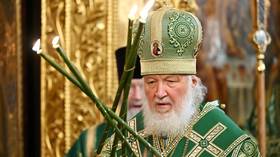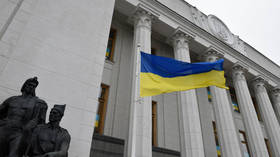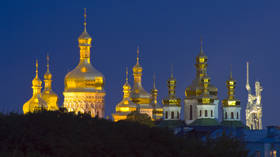‘Humans can’t live without war’, Christian patriarch laments

Armed conflicts appear to be an integral part of humanity’s existence, the chief bishop of the Russian Orthodox Church, Patriarch Kirill, said on Thursday. That does not mean the international community cannot or should not seek to minimize the human costs and suffering associated with them, he said at the religious festival ‘Faith & Word’ being held in Moscow Region.
“Unfortunately, one has to admit that humanity appears to be unable to live without war,” the patriarch said, adding that it is a part of “the corrupt human nature.” People around the world should still strive to overcome those destructive tendencies, the head of the Russian Orthodox Church believes.
“We can and [we] must minimize… harm resulting from hostilities, if they do break out,” the patriarch stated. His words came amid the continuing conflict between Moscow and Kiev and a fresh escalation between Israel and the Gaza-based Palestinian Hamas militant group.
Kirill then said that peoples that share the same faith and beliefs have an even stronger obligation to do so. The church leader was particularly referring to Russians and Ukrainians, who have been locked in a protracted struggle lasting for more than a year and a half. Those two peoples “come from a single baptismal font,” he added.
His speech came just a day after the Ukrainian parliament approved in the first reading a bill aimed at essentially banning the Ukrainian Orthodox Church (UOC) over its links to Moscow.
Bill 8371 officially envisages prohibiting any religious organization “linked to Russia.” Its authors maintain that it would still “allow citizens of Ukraine to realize the right to freedom of worldview and religion guaranteed by the Constitution of Ukraine.”
President Vladimir Zelensky’s government considers the UOC – which traces its roots to the conversion of Kievan Rus to Christianity over 1,000 years ago – to fit the definition outlined in the bill since it maintains communion with the Moscow Patriarchate of the Russian Orthodox Church led by Patriarch Kirill.
The UOC has faced persecution in Ukraine since the start of the conflict. The church has seen its property, including the iconic Kiev-Pechersk Lavra, one of the country’s oldest monasteries, seized by government agents. Its activities have also been outlawed in several western regions of Ukraine.
Despite the persecution, the UOC remains the largest denomination in the country. It includes the Kiev archdiocese, some 50 other dioceses, and about 9,000 individual parishes.
The Ukrainian government set up a rival organization, the Orthodox Church of Ukraine (OCU), which was declared autocephalous – i.e., fully independent – by the Ecumenical Patriarchate in Istanbul in 2019.
The UOC denounced Russia over its decision to launch a military operation in Ukraine back in February 2022. Yet, it did not declare itself autocephalous from the Moscow Patriarchate. Russia has repeatedly condemned what it calls persecution of the UOC, while the US has turned a blind eye to the issue.















